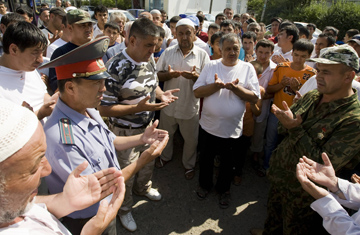
Kyrgyz police officers (2nd and 3rd left) pray with residents of Uzbek district of the city of Osh June 29, 2010. Outright violence may have stopped for now, but tension is still simmering
(2 of 2)
But one only has to walk through Osh to see evidence of ethnic conflict. The large Uzbek neighborhood of Cheryomushki, for example, is a total ruin, with entire streets reduced to blackened husks. The adjacent Kyrgyz neighborhoods stand intact. All around Osh, the famous Uzbek cafes and tea houses known as Chaihanas have all been torched. Every one of them is abandoned, and only a few shabby Russian and Kyrgyz restaurants remain in this city, the second largest in a country of 5.5 million.
According to U.N. officials, of the 400,000 people who fled the violence in June, almost all were from the Uzbek minority, which accounts for about 15% of Kyrgyzstan's population. About 100,000 of them escaped across the border to Uzbekistan and lived in refugee camps until the rioting subsided. When Kyrgyz officials promised them security and assistance, they returned home — only to find they had neither.
On July 20, Doctors Without Borders said it has seen clear signs that the Uzbeks are being persecuted. "In our mobile clinics and health facilities with which we collaborate, our medical teams treat patients who recently suffered heavy beatings or who even show signs of torture," said Andrei Slavuckij, the NGO's program manager for Kyrgyzstan, in a statement. "Many people, especially from the Uzbek community in Osh, told us they are not going to a public medical structure as they are afraid of being arrested." At a press conference in Geneva that same day, Rupert Colville, a spokesman for the U.N.'s High Commissioner for Refugees, described the humiliation of Uzbeks in southern Kyrgyzstan, citing evidence that detainees are being "beaten, punched or kicked until they sing the Kyrgyz national anthem perfectly, or speak some sentences in Kyrgyz without any trace of a 'foreign', i.e. Uzbek, accent."
But the Talipov family's suffering goes far beyond humiliation. They received word on July 25 from a friend in the local hospital that Alisher, 33, had suffered a heart attack while in detention and needed urgent medical treatment. He also had a broken jaw which had been left untreated and had healed incorrectly, making it difficult for him to eat or speak. "Even the Red Cross volunteers told us that tears came to their eyes when they saw the state he was in," says his brother Babur. The International Committee for the Red Cross in Kyrgyzstan confirmed to TIME that they visited Alisher in jail on July 23 but could not comment on his condition, citing confidentiality agreements with the Kyrgyz government.
"My brother agreed to confess to murder so that they would let the rest of us go," Babur says, his voice faltering. "He sacrificed himself for us. Do you understand? And now he's dying."
